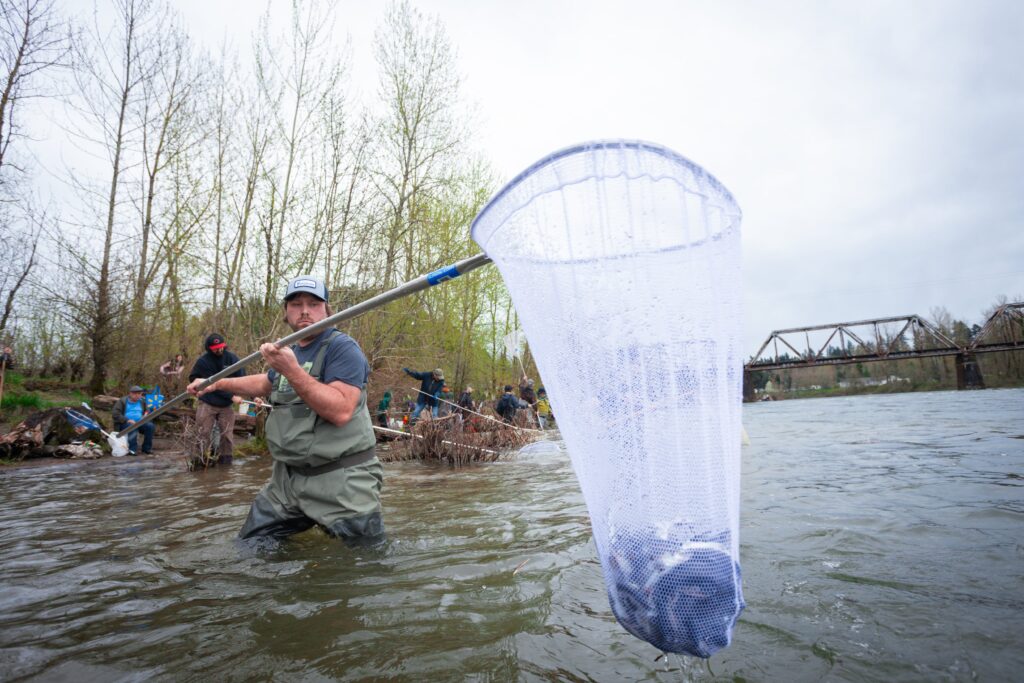Oregon wildlife officials voted last week to reconsider a hunting and fishing agreement with the Confederated Tribes of Grand Ronde — the latest twist in
an ongoing conflict
between state agencies and area tribes.
The Oregon Fish & Wildlife Commission voted 4-2 Friday to revisit its memorandum of agreement with the Grand Ronde tribe, a
five-year agreement signed in 2023
that allows the tribe to issue its own hunting and fishing licenses to tribal members for subsistence and ceremonial harvest throughout a broad swath of Northwest Oregon, from the Cascade Mountains to the Oregon coast.
The agreement is similar to ones the state had
previously signed
with other area tribes.
A coalition of tribes — The Confederated Tribes of Warm Springs, the Confederated Tribes and Bands of the Yakama Nation, the Nez Perce Tribe and the Confederated Tribes of the Umatilla Indian Reservation — petitioned the Oregon Department of Fish & Wildlife to revise its agreement with Grand Ronde, claiming the agreement interfered with the other tribes’ own fishing, hunting and gathering rights.
The state commission voted to support the petition following an impassioned
five-hour meeting
in which commission members questioned not only their previous decisions, but their role in determining the rights of Oregon’s tribes.
“This is an awful place to put us in,” commission member Leslie King, who voted for the proposal, said at the meeting. “It makes me queasy that we’re making these decisions about sovereign nations.”
The vote to revisit the agreement does not repeal it, the commission said. Their hope is for the tribes and the state to come back together to negotiate an arrangement that all parties can agree on.
Representatives for the Grand Ronde tribe said they were “outraged” by the decision, accusing the other tribes of swaying the commission with “lies and misinformation,” according to a news release sent out Monday.
“This was a painful setback, but we will not give up,” Grand Ronde Chairwoman Cheryle A. Kennedy said in the news release. “The agreement was never about competition with other tribes; it was about the continuity of our culture and long-held traditions. We remain fiercely committed to defending our homelands, our sovereignty and our heritage. We will not compromise on who we are as a people.”
The Confederated Tribes of Grand Ronde is the only federally recognized tribe in Oregon that is bound by a consent decree,
a condition placed on the tribe’s sovereignty that significantly restricts the hunting and fishing rights of tribal members.
In February, U.S. Sen. Jeff Merkley and Rep. Andrea Salinas
introduced legislation
to renegotiate those rights.
The other tribes, which do not operate under the same limitations, have long
chafed at the state’s agreement
with the Grand Ronde tribe, particularly around fishing rights at Willamette Falls, a place of
deep cultural and spiritual importance
for Indigenous peoples around the region. Their opposition led to the exclusion of Willamette Falls from the 2023 memorandum of agreement.
Still, the massive waterfall on the Willamette River between Oregon City and West Linn has remained a flashpoint of division. It is the site of two different tribe-led development projects — Grand Ronde’s
tumwata village
and a
state-backed
intertribal access project
— and is the subject of an
ongoing federal lawsuit
over a Grand Ronde fishing platform at the base of the falls.
The opposition on multiple fronts has left the Confederated Tribes of Grand Ronde feeling singled out as they attempt to exercise their cultural practices, tribal leaders have said. The other tribes have expressed frustration at working with the Grand Ronde tribe, which has previously
pulled out of intertribal negotiations
.
The Confederated Tribes of Warm Springs lauded the state’s decision Friday, calling it a good opportunity to ensure the state does not “mistakenly interfere” with the tribe’s treaty rights.
“Today the Commission directed ODFW to fix a mistake that harms our sovereignty,” Dennis White III, chairman of the Warm Springs Tribal Council, said in a news release. “ODFW must now consult with us on modifications to its agreement with the Grand Ronde Tribe to ensure that the agreement does not interfere with our treaty-protected fishing, hunting and gathering rights.”
Mary Wahl, chair of the commission, was one of two votes against revisiting the agreement. She argued that it was unfair to alter the deal two years in, and said she would prefer to see out the five-year agreement and take the other tribes’ critique into consideration in future discussions.
“I just can’t get to the point of taking back the [memorandum of agreement] because there wasn’t complete agreement,” Wahl said. “It’s deeply troubling to even have to deal with this, but I don’t think we should just hand it to staff and say ‘try again’ when in two years we haven’t fixed it.”
Mark Labhart, the other “no” vote, pointed out that the process to amend the agreement could take upwards of a year to finalize. He offered an exasperated plea for the tribes to use that time to work through their differences, highlighting the awkward position the commission members have found themselves in.
“I’m begging you, tribes, get together and see if you can work this out,” he said. “Don’t make us have to do this again.”





More Stories
Grand Ronde tribe outraged as Oregon officials vote to reconsider fishing agreement
Grand Ronde tribe outraged as Oregon officials vote to reconsider fishing agreement
Grand Ronde tribe outraged as Oregon officials vote to reconsider fishing agreement